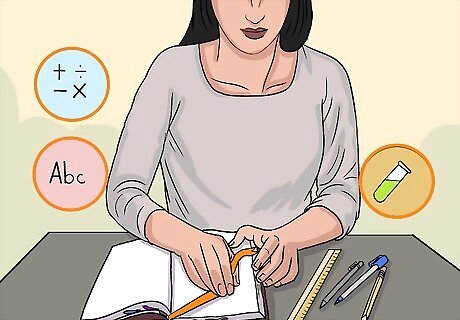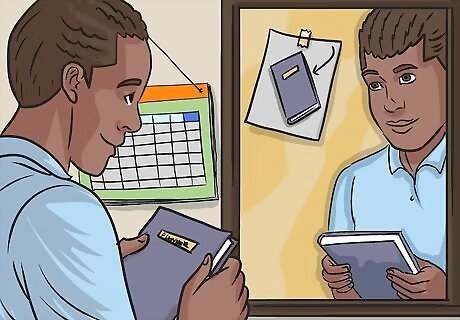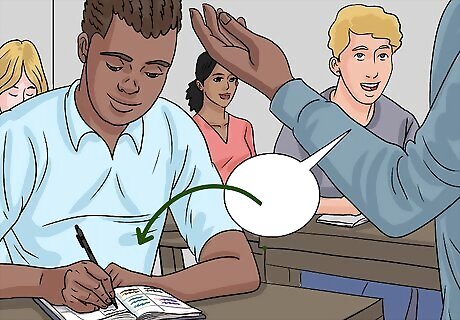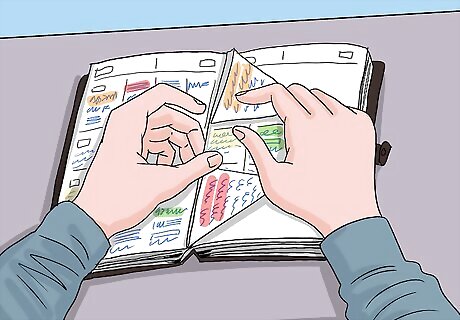
views
Setting Up Your Planner

Choose the right planner for you. You’ll want to pick one that fits in your pocket, purse, or backpack; whichever place you would like to carry it. Choose one in your favorite color or with a fun design so that it is aesthetically pleasing. Ensure it has enough pages and is organized in the way you prefer; some have a page per day, some have two pages per week, etc. There are different types of planners with different layouts. Some also have smaller sections while others have larger. Choose one that suits you the best. If your planner is too plain, consider decorating it. If you can't buy a planner, check out How to Make Your Own School Planner.

Create sections for every subject/course you take. You should do this ahead of time for an entire semester or year. Block out a space for each subject or course so when the time comes to write in it, you’ll know exactly where to put each assignment. Keep your classes organized by day. For example, if you have Math and Science on Monday, Wednesday, and Friday, put those sections next to each other.

Create a section for other events. You’ll likely have other things to do than homework, so make a section to record other engagements such as sporting events, concerts or recitals, dances or other school functions, work or chores, etc. You could schedule in free time as well. Consider creating separate sections for school-related activities and extracurricular activities. For example, a school ball game could be in one section and a concert in another.

Add birthdays and holidays. Write in birthdays, holidays, and other special events ahead of time. That way, when you look at a week or month you’ll know if there are any occasions that could change your schedule or take up extra time. You can also add information such as first and last days of school, holiday breaks, etc. You don't need to write in every single birthday--just focus on your friends and family. If you plan on doing something special on that day, such as a party, make a quick note of it.
Writing in Your Planner

Decide which method you will use. You may want to write down assignments on the day they were assigned or on the day they are due. This will depend on your personal style and preference. If you write things down on the day they were assigned, this will enable you to look at each day to see what you should be working on (e.g., If reading chapter 5 was assigned on Monday, you would write it down under Monday’s space and do the assignment that day). If you write things down on the day they are due, you will need to look ahead to see what you should be working on (e.g., If reading chapter 5 needs to be completed Wednesday, you would write it down under Wednesday’s space but look ahead on Monday or Tuesday in order to complete the assignment by Wednesday).

Make your planner a part of your daily routine. Write new information in your planner every day; any assignments, events, meetings, and get togethers you plan should be recorded daily. You should also check your planner each morning and night to ensure you aren’t forgetting to do anything. You can put a sticky note on your mirror or another place you look daily, or set a daily reminder in your phone, to help you remember to check your planner if you think you might forget. Some teachers like to write out assignments weeks ahead of time. If your teacher does this, you can transfer these assignments to your planner. Once you develop the habit of checking your planner, you may no longer need reminders, such as sticky notes on the mirror.

Fill in things as soon as you find out about them. Your teacher may mention that a group project will be due on the last day of class; though that may seem like a long way off, write it down immediately. This goes for homework, tests, other assignments, and events as well. Write down the corresponding textbook pages and any other information the teacher tells you to include. If you tend to procrastinate, consider putting reminders into your planner. For example, you can write "Start working on Shakespeare essay" the week before it is due.

Create your own deadlines. If you have a major project or test coming up you can schedule time to work on it in your planner. This will keep you from rushing to complete a big assignment the night before it is due. For example, you could write: Monday: start research Wednesday: complete outline Friday: write rough draft
Staying Organized

Color code your planner. You may want to do this by subject (blue for algebra, green for chemistry, red for English, etc.) or by type of assignment (blue for tests, green for homework, red for projects, etc.). Choose whichever method you think will be most helpful for you. You can do this with colored pencils, pens, highlighters, or even colorful sticky-note flags. EXPERT TIP Alicia Oglesby Alicia Oglesby Professional School Counselor Alicia Oglesby is a Professional School Counselor and the Director of School and College Counseling at Bishop McNamara High School outside of Washington DC. With over ten years of experience in counseling, Alicia specializes in academic advising, social-emotional skills, and career counseling. Alicia holds a BS in Psychology from Howard University and a Master’s in Clinical Counseling and Applied Psychology from Chestnut Hill College. She also studied Race and Mental Health at Virginia Tech. Alicia holds Professional School Counseling Certifications in both Washington DC and Pennsylvania. She has created a college counseling program in its entirety and developed five programs focused on application workshops, parent information workshops, essay writing collaborative, peer-reviewed application activities, and financial aid literacy events. Alicia Oglesby Alicia Oglesby Professional School Counselor Set up systems for organizing schoolwork. Use colored pens to code school subjects in planners and matching folders. Set phone alerts for tests, projects, and assignments, so you stay on top of work. Handwrite to-do lists by due date and class to help retain the information.

Look ahead. On the first day of each week you should scan your planner to see what is due or what events you have. This will give you a good idea of what you will need to do through the week as well as help your manage your time efficiently. For example, if you have a lot of exams or a large essay due during a particular week, it might not be a good idea to schedule other things, like parties.

Review your planner before you start your homework. This will give you an idea of what you need to do that day and help your prioritize assignments. It also ensures that you won’t forget anything and will avoid panicking the next day when you realize you didn’t do everything that was assigned. Start with assignments that are due the following day. If you have extra time that evening, you could do the other assignments to get ahead of schedule. If none of your assignments are due yet, consider doing the easiest ones first to get them out of the way. Alternatively, you could try doing the hardest one first.

Keep old pages. You never know when you may want to look back and check on something. If you don’t want to keep them in your planner, tear them out and store them in a box or a desk drawer. Some people like to fold the old pages of their planners towards the spine. This will create bulk, but it will also make it easier to find the newest page.



















Comments
0 comment